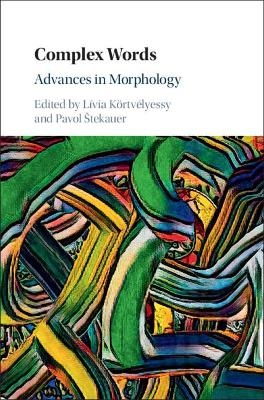
Complex Words
Cambridge University Press (Verlag)
978-1-108-49029-0 (ISBN)
A state-of-the-art survey of complex words, this volume brings together a team of leading international morphologists to demonstrate the wealth and breadth of the study of word-formation. Encompassing methodological, empirical and theoretical approaches, each chapter presents the results of cutting-edge research into linguistic complexity, including lexico-semantic aspects of complex words, the structure of complex words, and corpus-based case studies. Drawing on examples from a wide range of languages, it covers both general aspects of word-formation, and aspects specific to particular languages, such as English, French, Greek, Basque, Spanish, German and Slovak. Theoretical considerations are supported by a number of in-depth case studies focusing on the role of affixes, as well as word-formation processes such as compounding, affixation and conversion. Attention is also devoted to typological issues in word-formation. The book will be an invaluable resource for academic researchers and graduate students interested in morphology, linguistic typology and corpus linguistics.
Lívia Körtvélyessy Professor in the Department of British and American Studies, P.J. Šafárik University, Košice, Slovakia. Her research has focused on typology of word-formation and evaluative morphology. She is author of Evaluative Morphology from a Cross-linguistic Perspective (2015), On the Influence of Sociolinguistic Factors on Productivity in Word-Formation (2010) and co-author of Word-Formation in the World's Languages: A Typological Survey (2012). Pavol Štekauer is Professor in the Department of British and American Studies, P.J. Šafárik University, Košice, Slovakia. His research has focused on an onomasiological approach to complex-word-formation and interpretation. He is author of A Theory of Conversion in English (1996), An Onomasiological Theory of English Word-Formation (1998), Meaning Predictability in Word-Formation (2005) and co-author of Word-Formation in the World's Languages. A Typological Survey (2012).
Introduction: advances in morphology: a summary Jan Don and Martin Everaert; Part I. Lexico-Semantic Aspects of Complex Words: 1. Formal semantics and the problem of nominalizations Rochelle Lieber; 2. Semantically subtractive morphology Stephen Anderson; 3. -less and –free Mark Aronoff; 4. Instrument Nouns in -one in Latin and Romance Franz Rainer; 5. Prominence in noun-to-verb conversion Heike Baeskow; 6. On Spanish dvandva and its restrictions Antonio Fábregas; Part II. Structure of Complex Words: 7. Estonian case inflection made simple. A case study in word and paradigm morphology with linear discriminative learning Yu-Ying Chuang, Kaidi Lõo, James P. Blevins, and R. Harald Baayen; 8. Uninflectedness: uninflecting, uninflectable, and uninflected words, or the complexity of the simplex Andrew Spencer; 9. Complex exponents Gregory Stump; 10. Derivational patterns in proto-basque word structure Juliette Blevins; 11. The complexity of greek verbal morphology: the case of prefixed verbs Artemis Alexiadou; 12. Affixoids, an intriguing intermediate category Angela Ralli; Part III. Corpus-Based Case Studies: 13. Competition between synthetic nn compounds and nn.GEN phrasal nouns in polish: semantic niches, hapax legomena and low-level construction schemas Bozena Cetnarowska; 14. An s is an s', or is it? Plural and genitive-plural are not homophonous Ingo Plag, Sonia Ben Hedia, Arne Lohmann, and Julia Zimmermann; 15. The role of word-formation families and subfamilies in the organisation of German diminutive compounds Wolfgang U. Dressler, Sonja Schwaiger, and Jutta Ransmayr; 16. Semantic patterns in noun-to-verb conversion in English Salvador Valera; 17. Onomatopoeia: on the crossroads of sound symbolism and word-formation Lívia Körtvélyessy, and Pavol Štekauer; 18. Dingsbums and thingy: placeholders for names in German and other languages Petra M. Vogel.
| Erscheinungsdatum | 01.10.2020 |
|---|---|
| Zusatzinfo | Worked examples or Exercises; 22 Tables, black and white; 22 Line drawings, black and white |
| Verlagsort | Cambridge |
| Sprache | englisch |
| Maße | 235 x 160 mm |
| Gewicht | 730 g |
| Themenwelt | Geisteswissenschaften ► Sprach- / Literaturwissenschaft ► Sprachwissenschaft |
| ISBN-10 | 1-108-49029-8 / 1108490298 |
| ISBN-13 | 978-1-108-49029-0 / 9781108490290 |
| Zustand | Neuware |
| Informationen gemäß Produktsicherheitsverordnung (GPSR) | |
| Haben Sie eine Frage zum Produkt? |
aus dem Bereich


